Robert Aaron Long, the Atlanta-area shootings and the way white men look at Asian American women
The concept of the subservient, obedient, and sexual Asian woman is grounded in a history of exclusion and violence

Your support helps us to tell the story
From reproductive rights to climate change to Big Tech, The Independent is on the ground when the story is developing. Whether it's investigating the financials of Elon Musk's pro-Trump PAC or producing our latest documentary, 'The A Word', which shines a light on the American women fighting for reproductive rights, we know how important it is to parse out the facts from the messaging.
At such a critical moment in US history, we need reporters on the ground. Your donation allows us to keep sending journalists to speak to both sides of the story.
The Independent is trusted by Americans across the entire political spectrum. And unlike many other quality news outlets, we choose not to lock Americans out of our reporting and analysis with paywalls. We believe quality journalism should be available to everyone, paid for by those who can afford it.
Your support makes all the difference.On Tuesday evening, eight people, including six Asian women, were killed in shootings at three different massage parlors in Atlanta and Acworth, Georgia. Police have arrested 21-year-old Robert Aaron Long as a suspect in all three shootings. Long, who was reportedly a frequent visitor to the massage parlors, allegedly told police he went on a rampage because he had “a really bad day” and wanted to “eliminate the temptation” to feed a sex addiction. Georgia Representative Bee Nguyen commented today that the shootings appear to be “at the intersection of gender-based violence, misogyny and xenophobia”.
In the direct aftermath, at 11.49 pm on Tuesday, Celeste Pewter tweeted: “We absolutely need to talk about how Asian women are so often viewed as sexualized, subservient creatures, and the anger and violence that can happen when we fight to push off those stereotypes.”
I agree. We need to talk about it. Last night, my phone filled with messages and posts about the shooting from Asian American women, all of whom had been reminded by the news of harassment or acts of violence in their own lives.
Robin Zheng, assistant professor of philosophy at Yale-NUS College and author of a paper on race and fetishes, explains that a fetish is grounded in the concept of othering. The fetishizer projects stereotyped ideas onto someone, which are often little more than painful racist caricatures. Too often brushed off as harmless, this habit can have profoundly tragic consequences, both quietly continuous and singularly violent.
“I think that the fact that Asian women are stereotyped as sexually alluring or competent, which seems to be a positive trait in general, makes it seem like it’s a positive thing to be stereotyped that way,” Zheng told me. “It’s not necessarily positive, and it can also have the effect of reducing someone, especially someone of a racial minority who is already going to be flattened… to those qualities, and nobody wants to merely be an object of sexual interest.”
The concept of the subservient, obedient, and sexual Asian woman is grounded in a history of exclusion and violence. Congress enacted the Page Act of 1875 to prevent Chinese sex workers from immigrating to the United States — villainizing both Chinese women and sex workers in the process — and, as a result, prevented all Chinese women from entering the country’s borders. While this prevented all Chinese women from immigrating by their own volition, Asian women were simultaneously being trafficked into the States. Stereotypes of Asian women as little more than sex objects for white American men also have their roots in the American military presence in Asia, from Japanese brothels which were opened up to American troops in 1945 to “camptowns” in South Korea.
This violence is not new. But it is often discounted because Asians are so often seen as so-called “model minorities”.
Ellen Wu explains in her bookThe Color of Success that the model minority myth was an unintended outcome of attempts by Asian Americans to fight against violence and a system of discriminatory policies at the outset of the 20th century. The idea of the easily assimilated, quiet, high-achieving Asian American was a response to damaging portrayals of the Asian people as threatening, which had led to an uptick in violence against Asian immigrants. By the 1960s, the idea had really taken root — and it persists today. It is not a benevolent idea: this docile stereotype is both harmful to the Asian American community and often weaponized against other communities of color.
Last night, I lay awake, thinking about those women in Georgia. And about friends, colleagues, and acquaintances who texted me or popped up on my news feeds, one by one, over and over again. I thought about painful experiences and everyday comments, the small suggestions used to degrade and humiliate.
The experience of being an Asian woman in America involves constantly fighting against — or disappointing — expectations. It is wondering whether this person is interested in you because of you or because of an idea. It is an exercise in caution. And for me, like many others, it is an unconscious exercise in developing a personality far away from sexuality, afraid that any sign of liberation might result in painful backlash, pigeonholing, or outright violence.
As Georgia reminded us last night, that violence is not just an idea. It is a tangible thing just on the edges of the horizon, looming in the background, always too close for comfort and always, always real.
Join our commenting forum
Join thought-provoking conversations, follow other Independent readers and see their replies
Comments